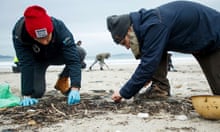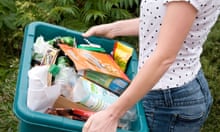Shoppers’ use of plastic carrier bags in England has continued to fall – by 59% in the last year alone – since the introduction of the 5p charge, according to recent figures.
Overall, sales of single-use plastic carrier bags have dropped by more than 95% in England’s main supermarkets since the charge was introduced in October 2015, government data reveals.
In the past 12 months, Asda, Marks and Spencer, Morrisons, Sainsbury’s, the Co-operative Group, Tesco and Waitrose sold 226m bags – 322m fewer than in 2018-19.
The average person in England now buys just four bags a year from the main supermarket retailers, compared with 10 last year and 140 in 2014, according to the data from the Department for Environment, Food and Rural Affairs (Defra).
The environment secretary, George Eustice, said: “It is encouraging to see in such a short space of time the huge difference our plastic carrier bag charge has had in reducing the amount of plastic we use in our everyday lives.
“We have all seen first hand the devastating impact that plastic bags have on the environment, littering our beautiful countryside and threatening the world’s marine life. I am committed to driving this progress further and I hope this continues to inspire similar action across the globe.”
The 5p charge was introduced in England to help reduce litter, protect wildlife and influence consumer behaviour after the number of carrier bags given out by the seven major supermarkets rose by 200m in 2014. At the time, consumers were using more than 7.6bn bags a year, amounting to 61,000 tonnes of plastic.
The charge applies to all retailers employing more than 250 people, although the government has consulted on extending this to all businesses as well as raising the minimum charge to 10p.
Despite the progress, research published last week found that plastic waste flowing into the world’s oceans was likely to nearly treble in volume in the next 20 years, while efforts to stem the tide have so far made barely a dent in the amount of waste in the oceans.
Sam Chetan Welsh, a political campaigner at Greenpeace, said: “Sales of plastic carrier bags are down by 322m, which is positive and sounds a lot, but sales of ‘bags for life’ rose to 1.5bn in 2018. And bags for life contain more plastic than carrier bags do. To deter people from using bags for life like throwaways, the government should increase the cost of bags for life, which successfully led to decreased sales in the Republic of Ireland, or ideally should ban them.
“But this is just the start. With UK supermarkets using 900,000 tonnes of plastic, we urgently need reductions in plastic packaging across every aisle of the supermarket, as well as at checkout. Whilst today’s figures are a step in the right direction, the government shouldn’t congratulate itself too much until this hard work is done.”
Anecdotal evidence suggests the drive to reduce single-use plastics in the UK has stalled since the outbreak of coronavirus, because of the increased use of masks, gloves, visors and disposable wipes amid fears of contamination, and because recycling rates plummeted during lockdown.
Separately, the Welsh government on Thursday launched a long-awaited consultation to establish whether some non-essential single-use plastics – including takeaway cups made from polystyrene – should be banned completely.










